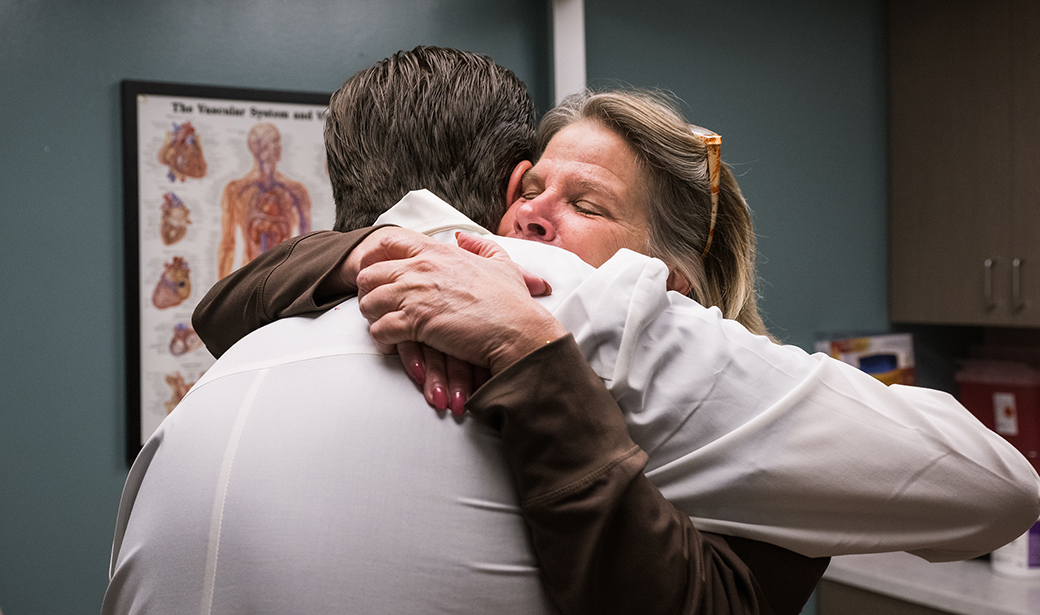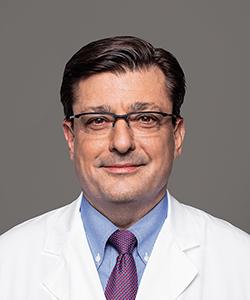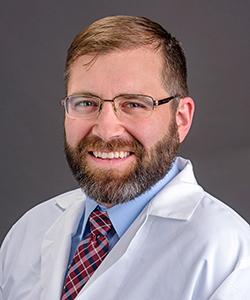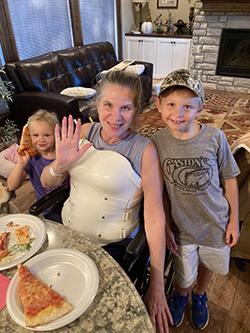If she let it, August 6, 2022, could have been the worst day of Tina Chambers’ life.
A doting grandmother and active outdoorswoman who enjoys duck and turkey hunting, the 57-year-old Chambers’ memory of the day that changed her life is remarkably clear.
Storm clouds had been chased off from the end of the week, and Tina and her husband Russ woke up that morning, a Saturday, to a mess of tree limbs brought down by the wind and rain.
The pair set about clearing their property in Brookfield, Missouri, the way they had countless times before, hauling downed oak limbs with an ATV and pulling down damaged branches with a log chain. Russ had just received a kidney transplant, so Tina was moving the branches and setting the chain, a chore she enjoys.
But something routine became life-threatening in an instant, as a branch bounced off the tree and fell toward Tina.
"My husband screamed, ‘Honey, get out of the way,’ and I took off running thinking I could get out of the way, but I tripped over another branch on the ground,” Chambers said. “I saw the limb falling at me and I just kind of squatted down and I remember saying to myself, ‘I'm done.’ I was just praying not to be paralyzed, and to see my grandkids again.”
The limb fell across her back and legs, causing severe internal trauma wounds. EMS swiftly arrived and moved Tina onto an ambulance cot. As they stabilized her, first responders realized it would be a short trip in the ambulance: They transported Tina away from the trees, down a gravel road to a clearing and waited for MU Health Care’s Air Medical Helicopter Service to arrive.
Tina remembers having difficulty breathing and worrying that the helicopter didn’t have room for her husband, before one of the paramedics onboard gave her anesthesia for the flight. As they landed at University Hospital, she marveled at seeing Columbia from the air, and what she saw on the ground.
“What really, really, really got me was when they were getting ready to take me out of the helicopter, I could see a line of nurses and doctors ready for me,” Chambers said. “And the pilot, I do not even know who he was, reached his hand back and he reassured me, saying, ‘Your name is power.’ That will stick with me forever.”
As a Level I Trauma Center, University Hospital is unique in mid-Missouri because doctors and nurses specifically trained in trauma and emergency medicine are on standby around the clock. Last year, MU Health Care treated more than 1,500 people like Tina in dire need of lifesaving care.
Scans and tests showed Tina had a broken right femur, or thighbone, just below her hip, and a broken left tibia at her ankle joint called a pilon fracture. But most critically, the falling limb had transected her aorta, partially tearing through the main highway of blood that carries oxygenated blood from the heart throughout the body.
The significant internal bleeding that occurs when your aorta is damaged is a severe, life-threatening situation. As many as 80% of people who suffer a transected aorta die at the scene, and 85% die within 24 hours.
To prevent that from happening to Tina, a team of vascular surgeons, led by Todd Vogel, MD, quickly moved her into surgery to stop the blood loss and repair her aorta. Because of Tina’s condition, Vogel and his team chose not to do open surgery and instead used a minimally invasive technique to place a graft inside her aorta using a catheter.
“In the past we would have used open surgery, a thoracotomy, but now we can use stent grafts, which is much better, because the aorta is so deep in the chest cavity,” Vogel said. “The graft stopped Tina’s bleeding.”
Tina would also need the expertise of Kyle Schweser, MD, an orthopaedic trauma and ankle surgeon at the Missouri Orthopaedic Institute, as well as that of the nurses, physical and occupational therapists and inpatient rehab experts at MU Health Care and Rusk Rehabilitation Hospital. But none of it would have been possible without the quick action of EMS, the Air Medical Service and the vascular surgery team.
Once she had recovered from her emergency surgery, Tina and Russ met with Schweser while in the hospital to talk about repairing the broken bones in her legs. Schweser used rods and pins to keep her ankle in place while the swelling went down before surgery and placed a metal rod in the hollow center of her femur to ensure the top and bottom re-joined properly when healing.
Tina left the hospital in a wheelchair because she had fractures in both legs and was not able to walk for six weeks after her ankle surgery. But she and her doctors had a plan to get her back on her feet, one she followed to the letter.
“Tina is a hugger, and I remember the first time she gave me a hug was when she was first walking after her injuries, and that meant a lot,” Schweser said.
During recovery, family was always at the front of Tina’s mind — hers, and the families of her doctors, nurses and therapists. As she went through rehab and follow-up appointments, she made sure to ask Vogel and Schweser about their children’s lives, and her grandkids were never far from her mind.
Thanks to regular check-ins from Schweser on both her physical and mental progress, and support from Russ, Tina’s recovery went smoothly.
“Everybody there focuses on you when you’re there,” Chambers said. “They’re all good at making that connection and they’re so good at their jobs. I wanted the doctors and nurses to feel successful and proud of me, because I was proud of them.”
She overcame her fear of getting into a car with the help of Rusk’s therapists and vehicle simulator, which gave her practice getting in and out of a car using a slide board. Tina set goals for herself, like being able to walk on a treadmill without fear of falling, and to play with and take care of her grandkids by herself.
“I’m still not done with recovery, but I am in better health than I was before the accident,” Chambers said. “When I was at Rusk, I knew I was going to have to work hard to rebuild muscle and that nobody could do it for me. To take care of my littlest grandson on Mondays and put him in the back of the truck and get up in it and go pick up the other two, those were goals that were really important to me. I’m so grateful for the team at MU Health Care and Rusk that helped me do it.”






